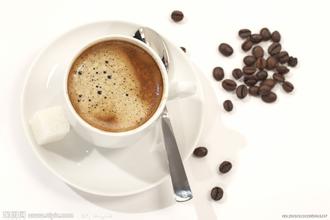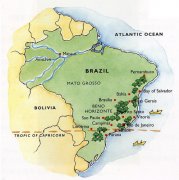Rwanda Coffee Manor Malaba Coffee Chimeier Manor
Mellow [Body]: the taste of the tongue after drinking coffee. The change of mellowness can be divided into light to light, medium, high, fat, and even Indonesian coffee is as thick as syrup.
Odor [Aroma]: the smell and aroma emitted after the coffee has been prepared. The words used to describe smell include caramel, carbon roast, chocolate, fruit, grass, malt, and so on.
Bitterness [Bitter]: bitterness is a basic sense of taste, and the sensory area is distributed in the base of the tongue. The bitterness of deep baking is deliberately created, but the common cause of bitterness is too much coffee powder and too little water.
Light [Bland]: coffee grown in lowlands, usually quite light and tasteless. Coffee with insufficient coffee powder and too much water will have the same light effect.
Salty [Briny]: after brewing, if the coffee is overheated, it will produce a salty taste.
The aroma of soil [Earthy]: commonly used to describe spicy and earthy Indonesian coffee, not the smell of dirt on coffee beans. Uniqueness [Exotic]: describes coffee with its unique aroma and special flavor, such as flowers, fruits, and spices. Coffee from East Africa and Indonesia usually has this property.
Aromatic alcohol [Mellow]: used to describe coffee with good acidity balance.
Mild [Mild]: used to describe a coffee with a harmonious, delicate flavor, used to refer to all plateau coffee except Brazil.
Soft [Soft]: describes low acidity coffee such as Indonesian coffee, and also describes it as mellow or sweet.
Sour [Sour]: a sense of taste in which the sensory area is mainly located at the back of the tongue and is characteristic of light roasted coffee.
Spice [Spicy]: a flavor or smell reminiscent of a particular spice.
Strong [Strong]: technically, it describes the advantages and disadvantages of various tastes, or the relative ratio of coffee to water in a particular conditioned product. In terms of popular usage, it describes the strong flavor of deep-roasted coffee.
Sweet [Sweet]: in essence, it is like fruit, and it also has something to do with the taste of wine.
Wild [Wild]: describes coffee with extreme taste characteristics.
Wine [Winy]: fruit-like acidity and smooth mellow, created by the contrast of special flavor. Kenyan coffee is the best example of wine flavor. In addition: coffee beans can only be roasted to become coffee beans for grinding and drinking, which are generally divided into light, medium, deep and special.

Important Notice :
前街咖啡 FrontStreet Coffee has moved to new addredd:
FrontStreet Coffee Address: 315,Donghua East Road,GuangZhou
Tel:020 38364473
- Prev

Indian coffee rainy season beans and aged beans Asian boutique flavor coffee products
When it comes to Asian coffee, the first impression of coffee lovers is often calm and calm. Asian coffee is generally characterized by thick flavor, strong sweetness and round taste, but slightly flat aroma and brightness. It is precisely because of the heavy nature of Asian coffee that it is very suitable to be used as a base when making Italian coffee. Raw coffee beans in Asia are generally processed by wet or semi-wet methods.
- Next

Tanzania Coffee Manor Arusha Coffee Manor Kilimazaro Mountain Fire area
Europeans give Tanzania a nickname for coffee gentleman, and Chinese coffee connoisseurs call it the coffee swordsman with the coffee king Blue Mountain and the coffee lady's mocha. Coffee is like the simple, frank and enthusiastic national character of Tanzania. Its refreshing acidity and medium mellowness complement sweet citrus and floral aromas. You can experience: the production phase of different nationalities
Related
- Does Rose Summer choose Blue, Green or Red? Detailed explanation of Rose Summer Coffee plots and Classification in Panamanian Jade Manor
- What is the difference between the origin, producing area, processing plant, cooperative and manor of coffee beans?
- How fine does the espresso powder fit? how to grind the espresso?
- Sca coffee roasting degree color card coffee roasting degree 8 roasting color values what do you mean?
- The practice of lattes: how to make lattes at home
- Introduction to Indonesian Fine Coffee beans-- Java Coffee producing area of Indonesian Arabica Coffee
- How much will the flavor of light and medium roasted rose summer be expressed? What baking level is rose summer suitable for?
- Introduction to the characteristics of washing, sun-drying or wet-planing coffee commonly used in Mantenin, Indonesia
- Price characteristics of Arabica Coffee Bean Starbucks introduction to Manning Coffee Bean Taste producing area Variety Manor
- What is the authentic Yega flavor? What are the flavor characteristics of the really excellent Yejasuffi coffee beans?

